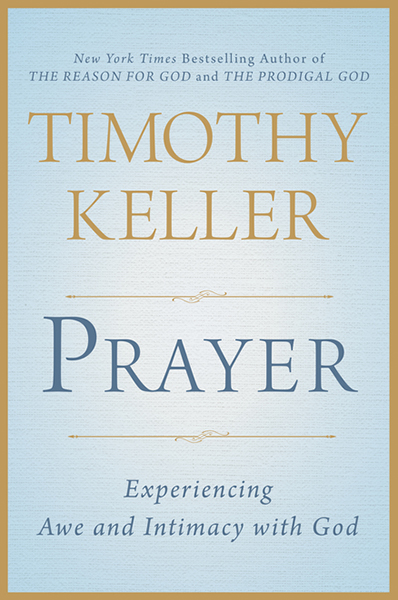
Tim Keller
Reviewed by: Jeremiah Montgomery
Prayer: Experiencing Awe and Intimacy with God, by Tim Keller. Viking, 2014. Hardback, 336 pages, list price $26.95. Reviewed by OP pastor Jeremiah Montgomery.
As a new pastor a few years ago, I confessed to a mentor that I struggled to pray. He was not surprised. “Prayer is the most spiritual thing we do,” he replied, “but we are so carnal.” Of course it is a struggle!
Tim Keller likewise begins his book by confessing his own struggle with prayer. The definition is easy: “Prayer is continuing a conversation that God has started through his Word and his grace, which eventually becomes a full encounter with him” (p. 48). The encounter for which it aims “involves not only the affections of the heart but also the conviction of the mind … to ask the Holy Spirit to help me experience my theology” (pp. 16–17). But the experience is often difficult.
So how do we learn to pray? The Bible and sound doctrine are foundational. “If God’s words are his personal, active presence, then to put your trust in God’s words is to put your trust in God.… If attended to with trust and faith, the Bible is the way to actually hear God speaking and also to meet God himself” (p. 54). “The more clearly we grasp who God is, the more our prayer is shaped and determined accordingly” (p. 62).
Building upon this foundation, Keller proceeds to explore what we can learn of prayer from Augustine of Hippo, Martin Luther, and John Calvin. He begins by distilling general principles from their writings. After this, he provides a guided exposition of the Lord’s Prayer, citing specific comments from these masters on each petition. Finally, he synthesizes all of the foregoing into twelve “touchstones” covering what prayer is, what it requires, what it gives, and where it takes us.
The final portion of the book provides two chapters on deepening prayer through biblical meditation and engaging the affections. (Here Keller draws insights from the prince of the Puritans, John Owen.) These are followed by three chapters on the major categories of prayer: adoration/thanksgiving, confession, and petition.
The concluding chapter and appendix provide practical models and patterns for daily prayer. Keller recommends a general model of evocation, meditation, Word prayer, free prayer, and contemplation. He offers readers basic patterns for morning and evening prayer, as well as a “starter plan” for those just beginning to pray seriously. He encourages persistence and offers encouragement for when our prayer lives feel dry.
Prayer is one of Keller’s finest and most useful books. Its central insight—the use of meditation as a bridge between Bible study and prayer—proved revolutionary to this reader. It showed me that we can map the four questions we ask in Bible study (What does this text teach us of God? of man? of Christ? of the Christian?) onto the five traditional categories of prayer (adoration, confession, thanksgiving, supplication, and aspiration). Keller encourages us to pray, not just by telling us about prayer, but by showing us how to pray.
November 16, 2025
November 09, 2025
November 02, 2025
October 26, 2025
October 19, 2025
October 05, 2025
Raising Sexually Faithful Kids and
Parenting Boys and Girls in a Gender-Confused World
September 28, 2025
© 2025 The Orthodox Presbyterian Church